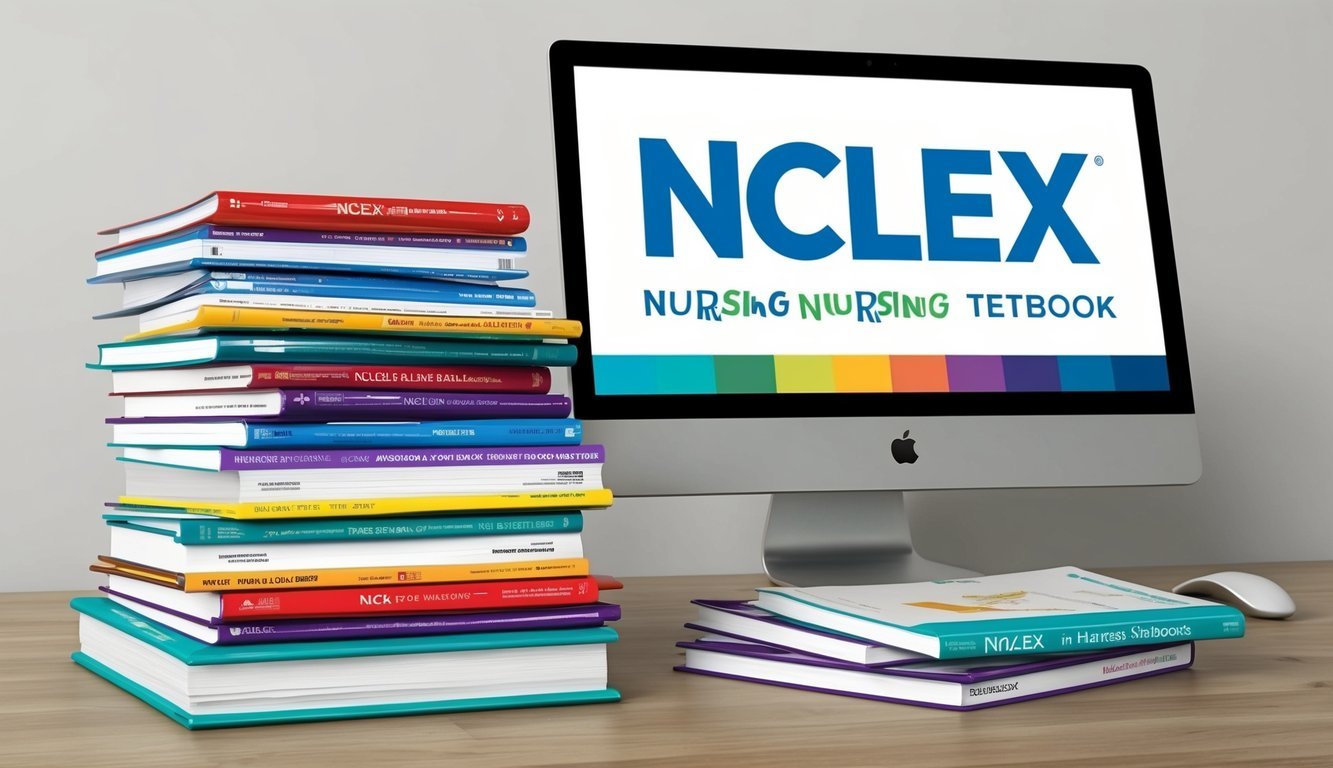The NCLEX, or National Council Licensure Examination, is a crucial step for anyone wanting to become a licensed nurse in the United States.
This exam assesses your knowledge and skills to ensure you can provide safe and effective care to patients.
Whether you are taking the NCLEX-RN or the NCLEX-PN version, passing this test is a key requirement for obtaining your nursing license.
Registering for the NCLEX involves several steps, including ensuring that you meet educational qualifications.
You will also need to familiarize yourself with the exam format, which is designed to evaluate your readiness to enter the nursing profession.
Understanding what to expect can help reduce anxiety and improve your chances of success.
Preparing for the NCLEX means diving into various topics that cover client needs and nursing practices.
After the exam, you will find out whether you passed, and this result will significantly impact your nursing career.
Key Takeaways
- The NCLEX is essential for obtaining your nursing license.
- Proper preparation can significantly increase your chances of passing the exam.
- Understanding the exam format helps reduce anxiety on test day.
Overview of the NCLEX
The NCLEX, or National Council Licensure Examination, is a critical test for nursing graduates.
It determines whether candidates have the skills and knowledge necessary to practice safely in the nursing field.
Understanding its purpose, structure, and the differences between the NCLEX-RN and NCLEX-PN is essential for any aspiring nurse.
Purpose and Importance
The primary purpose of the NCLEX is to ensure public safety by testing the competency of nursing candidates.
Administered by the National Council of State Boards of Nursing (NCSBN), this licensure exam evaluates whether you can provide safe and effective care.
Passing the NCLEX is mandatory to obtain your nursing license, whether you aim to become a Registered Nurse (RN) or a Licensed Practical Nurse (LPN).
The exam covers essential components of nursing care, including health promotion, maintenance, and management.
By passing the NCLEX, you demonstrate your ability to meet entry-level nursing standards, which helps ensure quality care for patients.
Structure and Content
The NCLEX exam is a computer-adaptive test, which means the difficulty of your questions adjusts based on your performance.
If you answer a question correctly, the next one may be harder.
Conversely, a wrong answer leads to an easier question.
The exam has a test plan that includes various categories of nursing care.
It assesses competencies like client needs, safety and infection control, and pharmacological therapies.
Here’s a brief overview of the main categories:
| Client Needs Category | Percentage of Exam |
|---|---|
| Safe and Effective Care Environment | 10–30% |
| Health Promotion and Maintenance | 6–12% |
| Psychosocial Integrity | 6–12% |
| Physiological Integrity | 38–62% |
You will find questions about nursing processes and clinical decision-making.
It ensures that you are prepared to handle real-world situations in healthcare settings.
NCLEX-RN vs NCLEX-PN
The NCLEX-RN is for those pursuing a career as a Registered Nurse, while the NCLEX-PN is for aspiring Licensed Practical or Vocational Nurses.
Both exams share similarities but focus on different scopes of practice.
The NCLEX-RN covers broader topics, including advanced nursing concepts and critical thinking skills.
You will encounter questions related to physical and mental health disorders, in-depth pharmacology, and comprehensive care planning.
On the other hand, the NCLEX-PN is narrower and focuses more on basic nursing skills and direct patient care.
Understanding these differences is crucial for preparing adequately for the exam that aligns with your career goals.
Registration and Preparation
Preparing for the NCLEX involves understanding the registration process, developing effective study strategies, and familiarizing yourself with the test plan.
Each step is crucial to ensure you are ready when exam day arrives.
NCLEX Registration Process
To take the NCLEX, you must first register for the exam with Pearson VUE.
Follow these steps to complete your registration:
- Submit Your Application: Apply to your state’s board of nursing for licensure. This often requires proof of completing a nursing program.
- Receive Authorization: Once approved, you will receive an Authorization to Test (ATT) from your state board.
- Register with Pearson VUE: Using your ATT, register online with Pearson VUE. You will pay the exam fee during this process, which can be completed quickly online.
Ensure all information is accurate and up to date.
For more details, visit the NCLEX registration page.
Study Strategies and Test Prep
Study strategies are essential for effective NCLEX preparation.
Consider the following methods:
- NCLEX Review Courses: Enroll in a review course that offers comprehensive preparation. These courses often provide valuable insights.
- Study Groups: Joining or forming a study group can help enhance understanding through discussion and shared resources.
- Practice Questions: Regularly answer practice questions to familiarize yourself with the exam format and types of questions. Aim for a mix of topics.
Develop a structured study plan that covers all essential areas of the NCLEX-RN test plan.
Balancing theory with practice helps reinforce your knowledge.
Understanding the NCLEX Test Plan
The NCLEX test plan details the exam’s content and structure.
Familiarizing yourself with it is vital for success.
Key components include:
- Content Areas: The test covers major areas like safe and effective care, health promotion, and psychosocial integrity.
- Question Types: The NCLEX uses computer-adaptive testing. Your performance on earlier questions will affect the difficulty of subsequent ones.
- Exam Format: Questions can include multiple-choice and alternate formats, such as fill-in-the-blank or hot-spot questions.
Reviewing the NCLEX test plan will help you tailor your preparation effectively.
Understanding these aspects can greatly improve your confidence and performance on the exam day.
Exam Format and the Testing Experience
The NCLEX exam uses a modern format designed to assess your nursing knowledge effectively.
It incorporates a type of testing known as Computerized Adaptive Testing (CAT), which adjusts the difficulty of questions based on your responses.
Understanding the different types of questions and what to expect on exam day can help you prepare effectively.
Computerized Adaptive Testing (CAT)
The NCLEX exam employs Computerized Adaptive Testing (CAT), meaning that the test tailors itself to your ability level.
As you answer questions correctly, the following questions become more challenging.
If you struggle, the questions will become easier.
This method provides a more precise evaluation of your knowledge and skills.
You will answer a minimum of 75 questions and a maximum of 145.
Your test can end any time your performance reaches a pass or fail decision.
This system allows for a more efficient testing experience, focusing on your unique strengths and weaknesses.
Types of Questions and Scoring System
The NCLEX includes different types of questions, such as multiple-choice, fill-in-the-blank, and enhanced item types.
The introduction of Next Generation NCLEX (NGN) includes innovative item formats that assess higher-level critical thinking.
These questions may require you to apply knowledge, analyze scenarios, or demonstrate clinical judgment.
Scoring for the NCLEX is based on a pass or fail system, driven by your ability to answer questions correctly.
The passing standard is set to ensure you possess the essential knowledge for safe and effective nursing practice.
Understanding these formats can improve your test-taking strategies.
Day of the Exam: What to Expect
On the day of the exam, you should arrive at the testing center early, where you will check in and provide identification.
You will take the test at a Pearson VUE center, which ensures a standardized experience for all test-takers.
Be prepared to follow specific guidelines, including what items you can bring into the testing room.
You will undergo a short orientation about the computer system before starting.
The exam can last up to six hours, but it may end sooner if your performance leads to a clear pass or fail result.
Remember to manage your time effectively and stay calm throughout the process.
Each question deserves your full attention, and pacing yourself will help you maintain focus and minimize anxiety.
Domains of Client Needs and NCLEX Content

Understanding the domains of client needs is essential when preparing for the NCLEX.
This section covers the key areas of nursing care and the importance of clinical judgment in effective patient management.
Fundamentals of Nursing Care
The fundamentals of nursing care focus on providing safe and effective patient care within various environments.
Key components include:
- Assessment: Gather comprehensive information about the patient’s health status.
- Planning: Develop a care plan that addresses the patient’s needs and goals.
- Implementation: Execute the care plan while ensuring patient safety and comfort.
- Evaluation: Assess the effectiveness of the care provided and adjust as needed.
Incorporating elements like health promotion and basic care ensures that you can meet varied client needs.
Familiarity with these stages enhances your ability to provide holistic care that respects psychosocial integrity and physiological integrity, essential topics covered in the NCLEX.
For further details, you can refer to the NCLEX-RN Test Plan.
Advanced Clinical Judgment and Decision Making
Advanced clinical judgment is crucial for effective nursing practice.
It applies critical thinking and decision-making skills in complex patient situations.
This includes:
- Clinical Judgment Model: Use this model to evaluate patient needs effectively.
- Pharmacological and Parenteral Therapies: Understand the administration and implications of these therapies on patient health.
- Evaluation Techniques: Regularly evaluate patient progress against established goals.
You will need to integrate these processes to refine your ability to respond to changing patient conditions.
This knowledge will be vital during NCLEX review courses and your nursing career.
For more information about these categories, visit Dummies’ Guide to NCLEX Client Needs.
After the Examination
After completing the NCLEX, understanding your results and what to do next is essential.
This phase is crucial in your journey to becoming a licensed nurse and maintaining your competency in the nursing field.
Interpreting Results and Next Steps
Once you receive your NCLEX results, you will know if you have achieved the passing standard.
If you pass, you can apply for your nursing license through your state board of nursing.
This process typically involves submitting proof of your education and exam results.
If your score does not meet the required standards, review the NCLEX test plan and focus on areas needing improvement.
You can retake the exam, usually after a waiting period.
Be sure to contact your state board for specific requirements on retaking the test.
Continuing Competency and Professional Development
After you obtain your nursing license, you need to pursue continuing education for your growth in the nursing profession.
Many states require licensed nurses to complete a certain number of continuing education hours to maintain licensure.
Participating in workshops, webinars, and conferences can enhance your skills and update your knowledge on best practices in nursing.
It’s also beneficial to engage in networking opportunities with other professionals to share experiences and learn from each other.
You can explore resources like the National Council of State Boards of Nursing for guidance on maintaining your competency in nursing practice.
Keeping up with advancements and changes in the field ensures you provide the best care to your patients.
Frequently Asked Questions

When preparing for the NCLEX, you may have specific questions about costs, requirements, types of questions, pass rates, and the significance of passing the exam.
This section addresses those common inquiries to help you understand the NCLEX better.
How much does the NCLEX examination cost?
The registration fee for the NCLEX exam varies by state but typically ranges from $200 to $300.
Additional fees may apply if you need to retake the exam or if you are taking it in a different state.
What are the requirements to sit for the NCLEX?
To take the NCLEX, you must have completed a nursing education program that is accredited.
After graduation, you need to apply for licensure in your chosen state and register for the NCLEX through Pearson VUE.
What types of questions can be expected on the NCLEX exam?
The NCLEX exam includes multiple-choice questions, as well as alternative question types like select-all-that-apply, fill-in-the-blank, and hotspot questions.
These assess a range of nursing knowledge and skills necessary for safe practice.
What is the average pass rate for the NCLEX exam?
The average pass rate for first-time test-takers of the NCLEX-RN is typically around 85%.
For the NCLEX-PN, the pass rate is similar, but it can vary by year and by state.
In which countries is the NCLEX-RN exam applicable?
The NCLEX-RN is primarily used in the United States and Canada.
Some states may also allow international nursing graduates from specific countries to take the exam.
What does passing the NCLEX signify for a nursing graduate?
Passing the NCLEX signifies that you have met the national standards for nursing practice.
It allows you to receive your nursing license.
This enables you to work as a registered nurse in your state.

